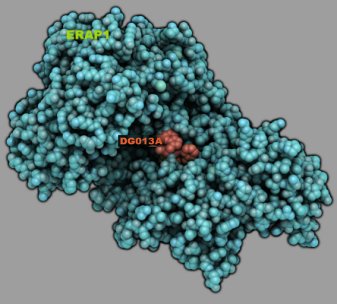|
November 19, 2013
A NOVEL APPROACH TO CANCER IMMUNOTHERAPY Dimitris Georgiadis Lab. of Organic Chemistry, Department of Chemistry, University of Athens Cancer chemotherapy is often ineffective due to the low selectivity and high toxicity of the chemical compounds used to target cancer cells. A promising alternative approach is to help the patient’s own immune system to fight cancer (immunotherapy). However, such approaches have yet to fulfill initial hopes, in part due to our limited understanding of how the immune system recognizes cancer cells and how cancer learns to avoid the immune response. It has been recently demonstrated that one mechanism that the cancer cells can use to circumvent the human immune system is by destroying the small molecular "signals" that the cell uses to indicate that it is diseased. These "signals", called antigenic peptides, are often destroyed inside the cell by enzymes named aminopeptidases, most notably aminopeptidases ERAP1 and ERAP2. Scientists have previously shown that blocking the function of ERAP1 can lead to immune system mobilization, killing of the cancer cells and in some cases full recovery of experimental animals from cancer tumors. Although, in theory, it should be possible to design chemical compounds called inhibitors to block this enzyme, the development of potent inhibitors for ERAP1 has proven to be very challenging. Notably, although it has been more than 10 years since the discovery of the role of these enzymes in the immune response, no research group has communicated the development of highly potent ERAP1 or ERAP2 inhibitors.
Researchers of the National and Kapodistrian University of Athens together with researchers from the National Center of Scientific Research "Demokritos" and in collaboration with research groups in the University of Southampton at the UK and Michigan State University in the USA, using information gathered after several years of research on the functions and structure of these enzymes, utilized a multidisciplinary method for inhibitor design called "structure-guided rational drug design". Using this method, they managed to develop small chemical compounds that effectively block these enzymes and showed that these compounds were able to activate the generation of antigenic peptides in cells. Furthermore, they were able to demonstrate that specialized immune system cells could, in the presence of the inhibitors, efficiently recognize and kill cancer cells that normally evade the immune system and establish tumors in mice. These results establish that the pharmacological inhibition of this family of enzymes can constitute a promising avenue for cancer immunotherapy and pave the way to future studies to optimize the compounds and evaluate them for clinical applications.
This work has been published in the Proceedings of the National Academy of Sciences (PNAS). Zervoudi E, Saridakis E, Birtley JR, Seregin S., Reeves E, Kokkala P, Aldhamen YA, Amalfitano A, Mavridis IM, James E, Georgiadis D* and Stratikos E*: "A rationally designed inhibitor targeting antigen-trimming aminopeptidases enhances antigen presentation and cytotoxic T-cell responses", Proc Natl Acad Sci USA, 2013 in press. (doi:10.1073/pnas.1309781110)
For additional information, please contact Assist. Prof. Dimitris Georgiadis, Laboratory of Organic Chemistry, Department of Chemistry, NKUA. (e-mail: dgeorgia@chem.uoa.gr)
<Επιστροφή στη λίστα επιστημονικών θεμάτων και ανακοινώσεων> |

